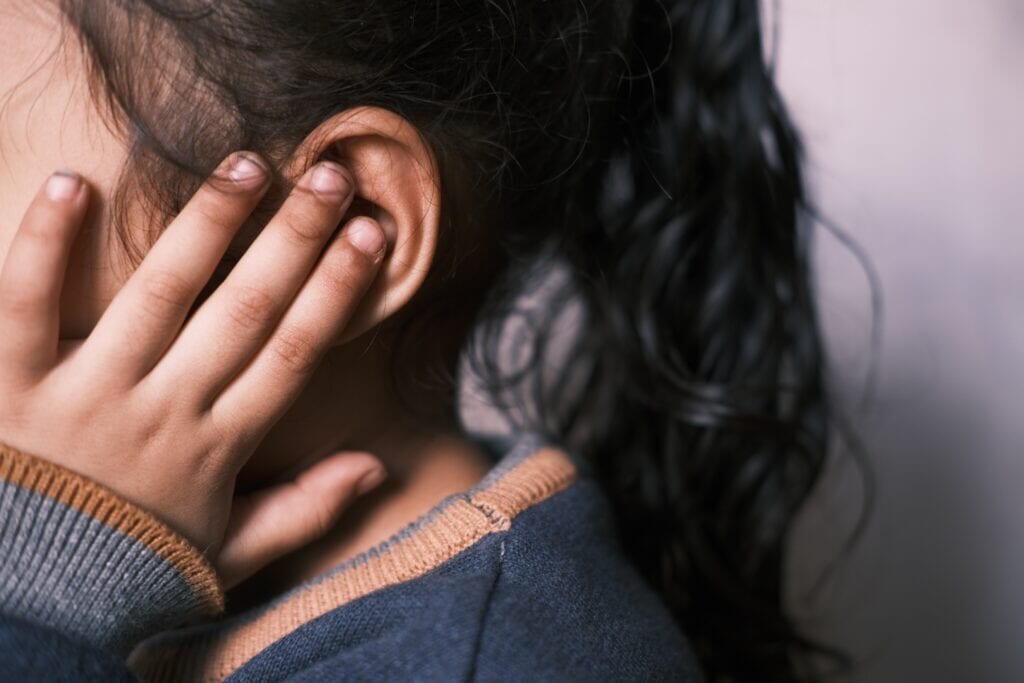Tinnitus is usually a benign, if frustrating, condition – but what if you hear a ringing sound in only one ear? Is it a sign of something more serious?
There are many reasons you could develop tinnitus, and the most common conditions are generally not dangerous. Unilateral tinnitus symptoms, however, may have a different set of causes and could be related to underlying conditions.
What Is Tinnitus?
Tinnitus is defined as the perception of sound when there is no external source. This can be heard as a ringing in your ears, buzzing, whooshing, clicking, or many other kinds of sounds. This phantom auditory phenomena is extremely common and although we still don’t understand the underlying cause in all cases, almost everyone experiences tinnitus at least once. For about 15% of adults, it can be considered chronic tinnitus, where the sound is persistent and sometimes bothersome. However, for the majority of people who experience tinnitus, the ringing in the ears may be infrequently heard or described as non-bothersome.
"Treble Health helped me reduce my tinnitus by about 80%, and now I can live my life again!"


"Treble Health helped me reduce my tinnitus by about 80%, and now I can live my life again!"
– Steve D.
Book a free consultation to learn which Treble Health solution is right for you. Join Steve and thousands more who have found lasting tinnitus relief.
Most tinnitus is subjective – that is, only you can hear the tinnitus sounds. A small number of people will experience objective tinnitus that can be heard by others. This is usually related to blood pressure or a blood flow problem where there has been damage to the blood vessels within the body resulting in pulsatile tinnitus.
Why Do We Experience Tinnitus?



Most causes of tinnitus are benign (not dangerous), do not indicate a serious medical problem and result from changes in the auditory mechanism. Specifically, changes or damage to the hearing organ can trigger phantom sound perception.
The sensory organ of hearing, called the organ of Corti, is located deep inside the inner ear, also known as the cochlea. The organ of Corti has thousands of tiny hairs that are responsible for sending hearing impulses to the hearing nerve, which then brings those signals to the brain in the form of electrical signals. The hearing mechanism is quite fragile, so when too many of these hair cells are damaged, our ability to interpret sound changes. For many of us, this leads to tinnitus and hearing loss.
Bilateral and Unilateral Tinnitus
Most often, tinnitus is experienced as a vague sound “somewhere in your head” or a general ringing in both ears. This is called bilateral tinnitus, since it’s perceived on both sides. However, sometimes people will notice tinnitus in one ear only – this condition is known as unilateral tinnitus. The majority of conditions related to tinnitus are not harmful, but a few can be cause for concern, especially if they lead to unilateral tinnitus. Determining the underlying cause is a crucial step in managing tinnitus, so speak to your doctor if you notice significant tinnitus in only one ear. Your doctor may recommend a physical exam, hearing test, or imaging tests such as an MRI (magnetic resonance imaging) to help diagnose what’s causing your tinnitus.
Common Tinnitus Causes
Tinnitus itself is usually caused by a range of underlying conditions related to your ears. In the majority of cases, tinnitus is a phantom sound perceived by the auditory areas of the brain because the brain does not receive enough information from the inner ear hair cells.
Aging Process and Age-Related Hearing Loss



As we age, our bodies go through natural changes and are exposed to loud noise and environmental toxins. This causes a gradual decline in the number of hair cells, eventually leading to age-related hearing loss. About 90% of people who have tinnitus also experience some degree of hearing loss. Tinnitus due to the aging process is typically bilateral – that is, present in both ears.
Loud Noise Exposure
Another common cause of tinnitus is exposure to loud noises. Damage to the hair cells of the cochlea could occur from a single extremely loud sound, such an explosion. It can also happen over time due to a prolonged and repeated exposure to medium to high level sounds. For this reason, musicians, veterans, and people who work with loud machinery tend to develop tinnitus due to loud noise exposure more often than others. For this reason it is so important to utilize hearing protection devices such as ear plugs to protect yourself from overly loud environmental sounds in order to reduce the likelihood of increased hearing loss and worsening tinnitus symptoms.
Tinnitus caused by noise is usually bilateral. However, in some cases it could also be unilateral if the exposure occurred in one ear only. For example, people who spend a lot of time behind the wheel, such as taxi or truck drivers, have poorer hearing and unilateral tinnitus in the left ear because of the traffic noise exposure over time.
What Does Tinnitus In One Ear Mean?
Unilateral tinnitus can be a warning sign of a serious medical condition. Compared to bilateral tinnitus, it is more likely to have an underlying medical issue that needs to be addressed. Audiologists consider unilateral tinnitus an otologic red flag, so do not try to wait for tinnitus to go away on its own. In cases like this, a medical professional will be able to determine if your tinnitus could be a symptom of something serious. Your doctor will ask several questions to uncover the root cause of your tinnitus:



Your doctor will ask several questions to uncover the root cause of your tinnitus:
- What is the nature of your tinnitus? Tinnitus in one ear only is a symptom that may require urgent care. Consider the duration, sound type, frequency, intensity, and other symptoms associated with your tinnitus.
- How long have you noticed tinnitus? New onset tinnitus should be checked out quickly in general.
- Does your tinnitus come and go, or is it a constant sound? Ongoing tinnitus can be a sign of a medical condition, and it can greatly affect your life. Tinnitus can be very stressful, and some people with persistent tinnitus experience anxiety, depression, or insomnia.
- Is your tinnitus synchronized with your heartbeat? Some people may have pulsatile tinnitus, which means that your tinnitus pulses in time with your heartbeat. Pulsatile tinnitus can be relatively harmless, but could also be a sign of a serious medical condition, such as a brain tumor or heart problem, so be sure to talk to your doctor.
- What other symptoms are you experiencing? If you have ear pain, dizziness or vertigo, vision changes, headaches, and/or facial numbness, you should seek medical attention as quickly as possible. If you have symptoms such as a head injury, facial weakness, or other urgent symptoms you should seek out immediate medical care at the emergency room immediately.
Ear Conditions That Could Cause Unilateral Tinnitus
There are many known causes of tinnitus, but some conditions are more likely to impact just one ear, leading to unilateral tinnitus:
- Blockage in the ear canal, often from excessive earwax
- Foreign objects in the ear canal
- Congestion in the ear and sinus infections
- Middle ear infection
- Inner Ear disorder such as:
Causes Of Unilateral Tinnitus Explained
As we can see, there are many possible causes of unilateral tinnitus. It could be something as simple as an active ear infection or a certain medication. On the other hand, it could be from something more intense, such as an acoustic trauma from exposure to loud noise. This may be from a sound like the discharging of a gun close to the ear, attending a loud concert or from working around loud machinery. It may or may not resolve on its own, and may also be accompanied by hearing loss.
Middle Ear Infections
Middle ear infections, also known as otitis media, could cause tinnitus in just one ear. Ear infections are typically accompanied by earache, hearing loss, and sometimes discharge. In cases of acute ear infection, the pain can be quite severe and spark a fever. In this case, seek urgent medical attention. With proper medical treatment, ear infections typically resolve. If left untreated, middle ear infections can cause irreparable damage to the middle ear bones or put you at risk for development of mastoiditis or meningitis.
Sudden Sensorineural Hearing Loss (SSHL)
Hearing loss itself can cause tinnitus. In the absence of sound input, your brain attempts to compensate, leading to a nuisance ringing in your ears. If you have a new onset of hearing loss, make an appointment with your audiologist right away. Tinnitus and hearing loss are closely related, so having sudden new hearing loss can definitely be accompanied by tinnitus, in either one or both ears. After proper medical intervention has been completed with a medical physician, hearing aids and tinnitus retraining therapy have both been shown to effectively reduce tinnitus symptoms in this patient population.
Acoustic Neuroma
Another possible cause of a unilateral tinnitus could be something called an acoustic neuroma, also known as vestibular schwannoma. This is a slow-growing, benign (non-cancerous) tumor that grows on the auditory nerve and can cause hearing loss and dizziness, as well as tinnitus. Even though acoustic neuromas are not cancerous, they can grow rapidly and interfere with brain function. Getting early and regular medical exams is important to prevent long-term issues and make sure that a neuroma is being managed safely and properly.
Labyrinthitis
Your inner ears do more than pick up on auditory signals. The vestibular system controls your sense of balance, coordinates your eye and head movements, and helps you detect your spatial position. Diseases of the vestibular system include labyrinthitis and Meniere’s disease.
Labyrinthitis is a viral or a bacterial infection of the inner ear, or the vestibular and cochlear nerve branches connected to it. It is called labyrinthitis because the most troublesome symptom – dizziness – comes from the dysfunction of the labyrinth, the inner ear organ within the vestibular system which controls our balance. You may also have hearing loss, vertigo and tinnitus. Like other ear infections, labyrinthitis may affect only one ear. It usually lasts only a few weeks with treatment from your doctor.
Meniere’s Disease
Meniere’s disease is a less common disorder of the inner ear, which can trigger attacks of vertigo and hearing loss in only one ear. These symptoms are also often accompanied by roaring tinnitus and pressure in the ear (aural fullness). Unfortunately, Meniere’s disease is a chronic progressive condition. You may experience temporary hearing loss, but it can eventually become permanent. Aside from progressive hearing loss, the symptoms are likely to come and go, and have the potential to lessen over time. There is no cure for Meniere’s disease, but there are treatments, including hearing aids, vestibular therapy and tinnitus retraining therapy that can help ease symptoms.
Non-Ear Related Causes Of Tinnitus In One Ear



It should be noted that unilateral tinnitus can also be due to a non-ear related disorder, such as:
- Temporomandibular joint (TMJ) problems
- Certain antibiotics
- Cancer drugs
- Nonsteroidal anti inflammatory drugs (NSAIDs)
- Blood vessel disorders
- High blood pressure
- Carotid artery issues
- Multiple sclerosis
- Autoimmune disorders
- Brain tumors
- Head and neck injuries
What To Do If You Develop Tinnitus In One Ear
Managing tinnitus can be tricky, especially because everyone’s experience is unique. The type, sound, and severity of tinnitus can vary, even from day to day. However, if you’re experiencing tinnitus in one ear, you should make it a priority to see a medical professional, such as an ENT doctor or audiologist. Your doctors will complete tests to assess your hearing ability. They’ll also test whether the hearing between both ears is the same, or if each ear hears at a different level. Depending on the results of the tests, your doctor may order further tests and evaluations such as an MRI to determine if there is a more serious underlying issue.
What can be done about unilateral tinnitus? That depends on the root cause. If it is something simple like ear wax impacted in your ears, the wax can be removed fairly easily. If there is a sudden hearing loss or an active infection, you will likely require additional treatment. Only a doctor will be able to properly diagnose and treat you, so it is important to follow their instructions to avoid further, and possibly permanent, damage.
Whatever the cause of your tinnitus, rest assured knowing that our team of audiologists at Treble Health have helped thousands of patients reduce their tinnitus symptoms over time. If you would like to meet with an expert audiologist on our team, we recommend scheduling a complimentary telehealth consultation. This free, 20-minute Zoom call comes with no obligations, and is the perfect time to ask questions or address any concerns that you may have, and learn about the best treatment options for your personal situation.
Next Step: Book Free Consultation
- 75% of patients reduced their tinnitus within three months after following our recommendations.
- "I feel like Treble Health literally gave me my life back." - Randy S. (verified customer)
- Join thousands of people who have reduced their tinnitus after scheduling a free consultation.




















